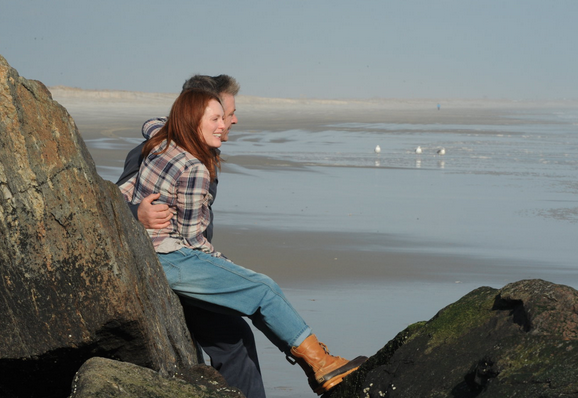It’s rare that a movie about a cause can toe the delicate line between raising awareness and being taken seriously without bordering on sheer triteness. Richard Glatzer and Wash Westmoreland’s adaptation of Lisa Genova’s 2007 novel, Still Alice, proves able to do just this.

Alice Howland (Julianne Moore), a brilliant linguistics professor who has made a name for herself at Columbia University and throughout the academic world, has noticed her memory acting a bit unusual of late. Her decision to see a neurologist is cinched after she gets lost while running on campus and has to pause for many minutes to consider where she actually is. Her neurologist, Dr. Travis Benjamin (Stephen Kunken), gives her a few simple verbal tests and then recommends an MRI and PET scan. With the outcome looking bleak, Alice reluctantly tells her husband, John (Alec Baldwin), that her doctor suspects she’s suffering from early onset Alzheimer’s.

When the diagnosis is confirmed, John and Alice are left no choice but to tell their three children, Anna (Kate Bosworth), Lydia (Kristen Stewart) and Tom (Hunter Parrish). The doctor also recommends that Alice gets tested for familial Alzheimer’s, a rare form that is passed down from one family member to another. Now, Alice must also add to the difficulty of telling them by mentioning that this is the form of the disease she has. Lydia, who lives in Los Angeles as she struggles to become an actress while her family worries for her financial future back in New York, is the one to react most calmly about it, saying, “I had noticed one or two things…You didn’t know Tom’s girlfriend when she came over.”

Alice’s condition rapidly worsens, even prompting her usual glowing class reviews to decline and cause the university to ask what’s been going on. After she leaves her position at Columbia, she looks to John increasingly for comfort, but can’t help but notice that he’s more committed to his own work than ever. Anna, who has tested positive for the Alzheimer’s gene, is busy trying to get pregnant, ultimately finding out that she’s going to have twins. Although people are there for her, Alice can’t help but feel lost in a sea of ever-waning memories. While still coherent, she makes a video to herself telling her how she can end it if she’s forgotten the answers to three essential questions. In a tragic twist of fate, when she discovers the video, she can’t even remember the instructions as she tries to execute them. Regardless, she is interrupted by her caretaker, dropping all the pills to the floor, which signals to herself that it wasn’t meant to be.

The contrast between how she is introduced to give a speech at the beginning of the film when it’s for something related to her field of linguistics versus toward the end when it’s related to Alzheimer’s is heartbreaking to note. And yet, there is something about Alice’s good-naturedness and determination–all the things in life she still has left to fight for–that make her persevere, that make her an inspiration to anyone who has suffered from the disease, whether directly or as a family member or friend.





















